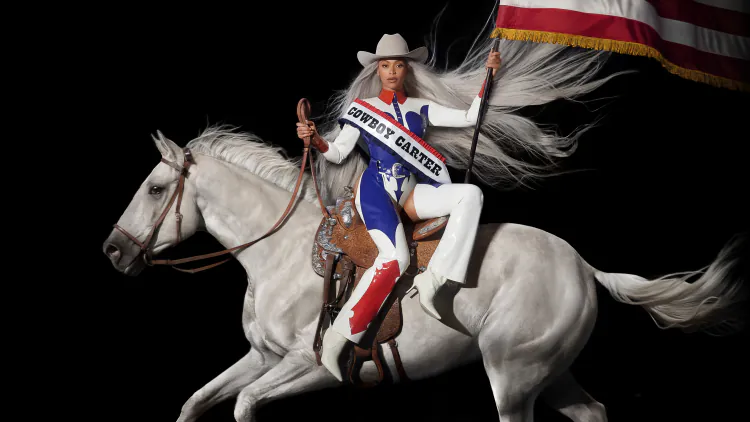Beyoncé Stands Her Ground
The singer’s spin on Dolly Parton’s “Jolene” is the key to understanding Act II: Cowboy Carter, her new album.

The power of Dolly Parton’s “Jolene” is that Dolly Parton sounds powerless. The guitar riff prickles nervously; the melody pleads in the manner of a hungry pet; Parton sings, in a trembling tone, about the woman who could and very well might take her man. It’s a love song to Jolene herself, expressing the sort of love a supplicant shows their god—desperate, fearful, needy for mercy.
But Beyoncé doesn’t do powerless. The 42-year-old pop star just released Cowboy Carter, her highly anticipated experiment with Americana musical traditions. With 27 tracks spanning 78 minutes, the album is a payload of provocation and flat-out astonishing music that will take a while to fully digest. Humble country touchstones—banjo licks, lyrics about boots and spurs—are stitched, with seams showing, to dizzying dance beats, lushly stacked vocal harmonies, and cartoonishly giddy raps and chants.
Beyoncé’s new, bloodlusting take on “Jolene” is the key to understanding what she’s up to. Parton herself introduces the song, in an interlude featuring the famous “Jolene” riff in the background. “Hey, miss Honey B, it’s Dolly P,” the 78-year-old legend says. “You know that hussy with the good hair you sing about? Reminding me of someone I knew back when.” Any fan of pop music will remember this hussy. Beyoncé’s 2016 album, Lemonade, insinuated that her husband, Jay-Z, had cheated on her. In an instant-classic couplet on the song “Sorry,” she sang, “He only want me when I’m not there / He better call Becky with the good hair.”
Pre-release rumors that Cowboy Carter would feature a version of “Jolene” make it unsurprising that Beyoncé now calls back to Becky—but the way in which she’s done so is still a shock. After the Parton speech, the riff surges from background to foreground. Beyoncé starts in on the famous melody, but in a tone that’s husky and heavy rather than fragile and light. Where Parton sang “I’m beggin’ of you, please don’t take my man,” Beyoncé sings, “I’m warnin’ you, don’t come for my man.”
The rewriting becomes more dramatic from there. Instead of “auburn hair,” this Jolene has “beauty and seductive stares” that try “to come between a family and a happy man.” Whereas Parton identified with the other woman, Beyoncé’s offers only this concession: “I can easily understand / Why you’re attracted to my man.” She then threatens Jolene: “You don’t want this smoke, so shoot your shot with someone else.” Beyoncé is not some hapless bystander; she’s a “Creole banjee bitch from Louisianne,” who’s been “deep in love for 20 years,” and knows her man “better than he knows himself.”
The music is basically faithful to the original, but the production is excessive, supercharged. Extra percussion clacks in the background, like the stomps of onlookers; a distorted voice saying “Jolene” echoes repeatedly, like the producer tag on a hip-hop mixtape. Toward the end of the song, Beyoncé sings a new melodic refrain: “I’ma stand by him, he gon’ stand by me.” A chorus of men reply, “I’ma stand by her, she gon’ stand by me.” That’s right: “Jolene,” a legendarily one-sided serenade, now features a male perspective.
On my first listen, I cackled. Beyoncé’s aggression is so outsize, so bold, as to amuse in the manner of a fight between reality-TV housewives. On the second listen, I felt sad. Popular culture is not in need of more songs in which women diss each other over a man. Nor are we lacking for singers—or, indeed, for Beyoncé songs—featuring bland boasts such as “I know I’m a queen.” Beyoncé replaced the vulnerability that made “Jolene” one of the best tunes of all time with a bunch of bad-bitch clichés. Is this how vain our culture has gotten—we’re unable to admit that someone else might be hotter than us, if only for a moment?
[Read: Black country is not a fad. It’s a legacy.]
Subsequent listens to the entirety of Cowboy Carter have softened me a bit toward the song. This is an altogether violent album—featuring gunplay imagery (on the funky interlude “Desert Eagle”), intimations of civilizational turmoil (on the astounding, psychedelic opener “Ameriican Requiem”), and a murder ballad (“Daughter,” which transforms, midway through, into an aria—another cackle-worthy moment). These lyrical gestures, combined with the album’s many sonic juxtapositions, help draw out an American hypocrisy. In white-dominated country music, dominance and defense are beloved lyrical tropes. In hip-hop, those same tropes get Black performers vilified as dangerous and even prosecuted.
Beyoncé’s subversion of that double standard plays into the deeper theme of the album, and really of all of Beyoncé’s recent work: the radical importance of marriage and family. For a long time now, she has been a sneaky traditionalist, using spectacle and artistry to sex up the idea of settling down with one man and sticking with him. She does that here with excellent raunch jams such as “Tyrant” and “Levii’s Jeans,” the epic electronica story-song “II Hands II Heaven” (“In these dark times, I’m so glad that this love is blinding”), and in folky gems whose titles—“Protector” and “Bodyguard”—suggest the idea of love as armor.
Beyoncé isn’t just playing into some trad-wife cultural resurgence or asserting her superiority over other women. In the context of American history explored on the album—such as a cover of the Beatles’ “Blackbird,” a song inspired by the mortal danger that 1960s civil-rights activists faced in the South—she’s asserting that the Black family has a right to defend itself against various forces that would undermine it, deprive it, and tear it apart. Cowboy Carter’s title, pairing Jay-Z’s last name with the pistol-toting frontier archetype, signals a warning—one that Becky, or Jolene, should heed.
What's Your Reaction?




















